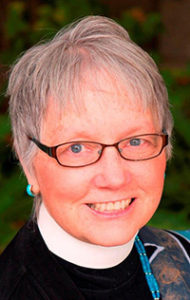 A new diocesan initiative will help Southland Episcopalians and diverse conversation partners bridge polarizing societal differences — a unique skill-set of “Anglican comprehensiveness,” Bishop John Harvey Taylor announced June 30 during the Rector’s Forum at All Saints Church, Pasadena.
A new diocesan initiative will help Southland Episcopalians and diverse conversation partners bridge polarizing societal differences — a unique skill-set of “Anglican comprehensiveness,” Bishop John Harvey Taylor announced June 30 during the Rector’s Forum at All Saints Church, Pasadena.
Known as “One in the Spirit: Finding Divinity Within Difference in the Diocese of Los Angeles,” the 3-year initiative will begin in September guided by a new staff officer, working group, and mission statement prioritizing four goals:
- “To live more fully into our baptismal promise to respect the dignity of every human being.
- “To understand better how barriers of class, race, language, nationality, culture, politics, geography, orientation, and identification blind us to the burning image of the divine in one another.
- “To proclaim in Christ’s name that we will not submit to our era’s epic division and polarization.
- “To feed hearts that are hungry for connection and community in a secularizing, isolating age.”
Born out of recent months of discernment, One in the Spirit invites the Diocese of Los Angeles “to deepen and broaden the mission of the Church as outlined in our catechism: ‘to restore all people to unity with God and each other in Christ,'” planners say.
The Rev. Canon Susan Russell, senior associate for communication at All Saints Church in Pasadena, has accepted the bishop’s invitation to join the diocesan staff in the capacity of implementing and coordinating the One in the Spirit initiative. She will divide her time between parish and diocesan work. A former president of Integrity, Russell now serves as co-chair of The Episcopal Church’s Task Force for Communion Across Difference, a denomination-wide group launched by action of General Convention.
“As one of the Church’s preeminent voices for justice, Canon Russell is both prophet and persuader, modeling how to manage differing viewpoints while remaining in community,” Taylor said. “In battling for marriage equity, she keeps her eye on the prize, and yet the unity of the church amid its vast diversity is an imperative for her as well. Her personal and vocational stories have led her to this new ministry of helping us better understand that what binds us together as a diocesan family, the grace and love of Christ, is stronger than anything that would tear us apart.”
“I am honored, humbled and thrilled at the opportunity to be part of the team imagining this transformative initiative and look to forward to the work we will do together in the weeks and months ahead,” Russell said. “To steal from Frederick Buechner, I believe God is calling us to the place where the deep gladness of the Gospel and the world’s deep hunger for healing meet – and I can’t wait to get started!”
Outlining context for the initiative, the One in the Spirit mission statement adds: “What we will build together over the next three years is our capacity as a diocese to expand relationships and deepen connections across differences in order to strengthen our shared commitment to follow Jesus. In response to the Gospel call to be agents of reconciliation, we envision a recovery of our deep connection to each other and our world so we can participate more fully in the transforming work of love.
“Our aspirations include creating conversational communities to drive bridge building across the differences that simultaneously enrich and challenge us as a diverse, multi-cultural diocese utilizing existing diocesan programs and resources as well as creating new ones….
“Ours are audacious goals: but the challenges of this present day call for nothing less if we are going to be the change we want to see in our beautiful and broken world. And we believe that as Anglicans we are uniquely wired to offer an antidote of hope and joy to the destructive and pervasive narratives that fuel division and polarization.
“We remember that we come from spiritual ancestors who found a way to hold together the seemingly irreconcilable tensions of being both catholic and protestant in the 16th century — and we believe that DNA of Anglican comprehensiveness will equip us to do the work of bridging the differences that challenge us as 21st century disciples.
“Because we are wired to love one another.
“The Bible tell us so. Our theology of the Incarnation tells us so. Our children and grandchildren tell us so when we are tempted to walk past someone in need. Not yet fully subject to human wisdom, the children say, ‘Can’t we help them?’
“Every human system, prejudice, ideology, and border in one way or another masks the face of God in the other. This may be the main reason we construct them. We give ourselves permission not to open our heart to someone because we know that if we do, we will end up mutually accountable and responsible.
“We might love them. And we’re afraid that we just can’t afford to.
“By the grace of God, as a diocesan family, we will resolve to tear down these walls — first in our hearts, then in our communities and world.”
